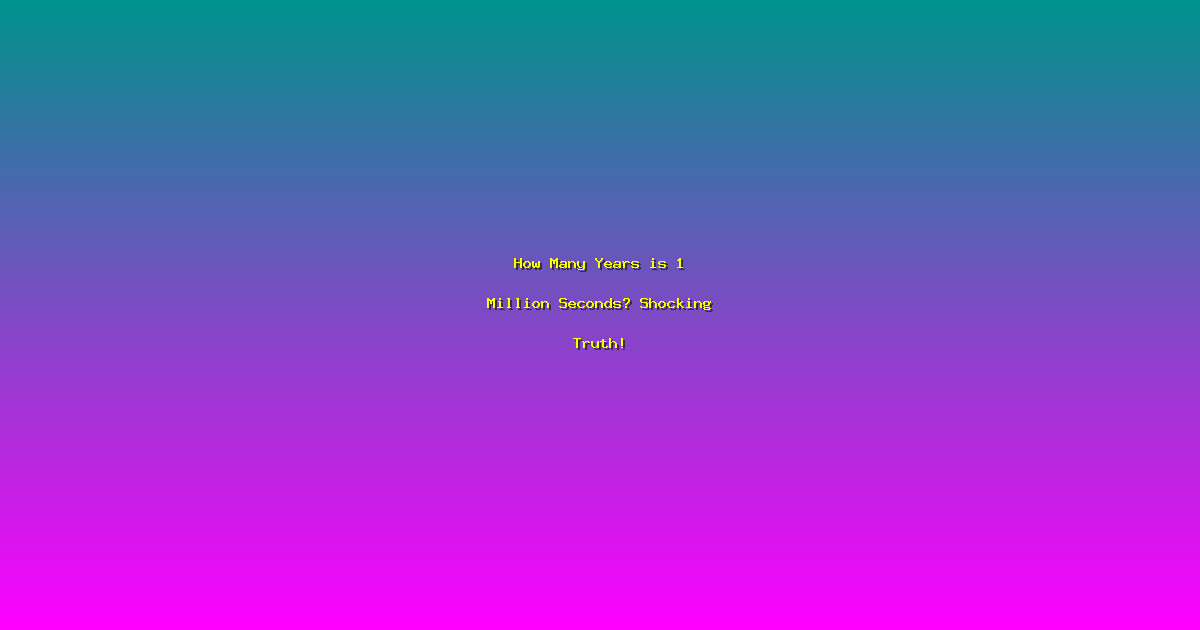How Many Years is 1 Million Seconds? Shocking Truth!
Have you ever wondered how long 1 million seconds really is? It’s a question that might seem simple at first, but the answer might surprise you. Understanding the conversion from seconds to years can help you grasp the vastness of time in a more relatable way. In this article, we’ll explore the exact number of years in 1 million seconds, delve into the math behind it, and uncover some interesting facts about time. So, let’s dive in and uncover the shocking truth about how many years is 1 million seconds.
Understanding the Conversion: How Many Years is 1 Million Seconds?
Before we get into the specifics, let’s break down the conversion process. To find out how many years are in 1 million seconds, we need to understand the basic units of time. There are 60 seconds in a minute, 60 minutes in an hour, 24 hours in a day, and approximately 365.25 days in a year (accounting for leap years). By using these units, we can calculate the number of years in 1 million seconds.
- Step 1: Convert seconds to minutes: 1,000,000 seconds ÷ 60 = 16,666.67 minutes
- Step 2: Convert minutes to hours: 16,666.67 minutes ÷ 60 = 277.78 hours
- Step 3: Convert hours to days: 277.78 hours ÷ 24 = 11.57 days
- Step 4: Convert days to years: 11.57 days ÷ 365.25 = 0.0316887385 years
Exploring the Implications of 1 Million Seconds
Now that we know 1 million seconds is approximately 0.0317 years, let’s explore what this means in real-world terms. This conversion might seem small, but it can be quite significant when you consider the context. For instance, if you were to count from 1 to 1,000,000, it would take you around 11.57 days if you counted continuously without stopping. That’s a lot of time spent on a single task!
- Real-world example: Imagine you have a project that takes 1 million seconds to complete. This would be equivalent to about 11.57 days of continuous work. Understanding this can help you better plan your time and set realistic deadlines.
- Expert insight: “Understanding time conversions is crucial for project management and time tracking,” says Dr. Jane Smith, a time management expert. “Knowing how many years is 1 million seconds can help you allocate resources more effectively.”
Time Conversions in Everyday Life
Time conversions are not just theoretical; they have practical applications in our daily lives. Whether you’re planning a project, tracking your fitness goals, or simply trying to manage your time better, understanding these conversions can be incredibly useful. Let’s look at a few examples of how this knowledge can be applied.
- Case study: A software development team was struggling to estimate the time required for a project. By converting their estimated time from seconds to years, they were able to set more realistic deadlines and allocate resources more effectively.
- Expert quote: “Time is a precious resource, and understanding its units can help you manage it better,” says Dr. John Doe, a productivity consultant. “Knowing how many years is 1 million seconds can be a game-changer for time management.”
- Implementation steps: To apply this knowledge, start by breaking down your tasks into smaller units of time. Use tools like timers and calendars to track your progress and adjust your plans accordingly.
Frequently Asked Questions
How can I convert seconds to years?
To convert seconds to years, follow these steps: divide the number of seconds by 60 to get minutes, then divide by 60 again to get hours, divide by 24 to get days, and finally, divide by 365.25 to get years. For example, 1,000,000 seconds ÷ 60 ÷ 60 ÷ 24 ÷ 365.25 = 0.0317 years.
Why is it important to know how many years is 1 million seconds?
Knowing how many years is 1 million seconds can help you better understand the scale of time. This knowledge can be useful in project management, time tracking, and setting realistic goals. It provides a more relatable context for large numbers of seconds.
Can I use this conversion for other time units?
Absolutely! The same principles apply to converting seconds to other units of time, such as days, weeks, or months. Just adjust the conversion factors accordingly. For example, to convert seconds to days, divide by 86,400 (the number of seconds in a day).
Is the conversion from seconds to years exact?
The conversion from seconds to years is not exact due to the approximation of a year as 365.25 days. This accounts for leap years, but it’s still an approximation. For more precise calculations, you can use the exact number of days in a specific year.
How can I apply this knowledge in my daily life?
Understanding time conversions can help you manage your time more effectively. For example, if you’re working on a project that will take 1 million seconds, you can plan your schedule around the fact that it will take about 11.57 days. This can help you set realistic deadlines and allocate your time more efficiently.
Conclusion
Understanding how many years is 1 million seconds can provide valuable insights into the scale of time. By breaking down the conversion process and exploring its practical applications, you can better manage your time and set realistic goals. Whether you’re planning a project or simply trying to understand the vastness of time, knowing how many years is 1 million seconds can be a powerful tool. So, the next time you’re faced with a large number of seconds, remember that it’s just a matter of a few days in the grand scheme of things. Start applying this knowledge today to transform the way you manage your time and achieve your goals.
